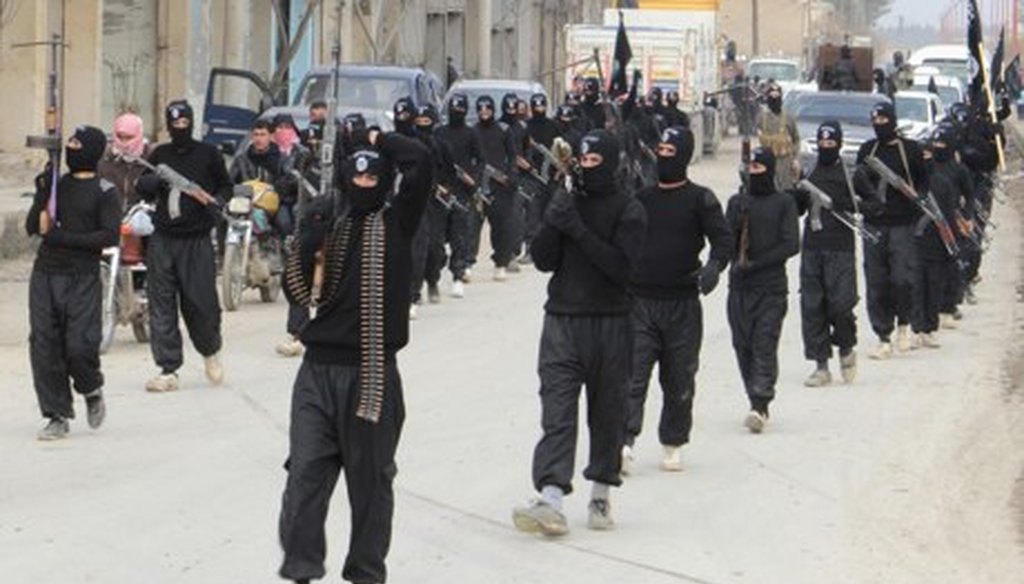Stand up for the facts!
Our only agenda is to publish the truth so you can be an informed participant in democracy.
We need your help.
I would like to contribute

Fighters of the Islamic State of Iraq in Syria parade in Tel Abyad. Syrian rebels' uneasy co-existence with the hardline Isis has turned to outright hostility. (Reuters)
It feels a little like 2003 lately, with Iraq in crisis and former Vice President Dick Cheney arguing for a muscular intervention to thwart the rise of violent anti-American extremists.
PolitiFact and PunditFact examined several claims about the country’s latest predicament with the Islamic State of Syria and Iraq, or ISIS.
Cheney wasn’t the only pundit whose claims needed a history lesson.
Cheney: Obama said terrorism ‘solved’ with bin Laden’s death
Cheney chased his attention-grabbing Wall Street Journal op-ed eviscerating President Barack Obama’s foreign policy with some TV appearances interviews, saying on ABC This Week that the Obama administration is not willing to recognize the problem at hand.
Sign up for PolitiFact texts
"They're still living back in the day when they claimed we got (Osama) bin Laden, terrorism problem solved," Cheney said.
Obama has talked up killing bin Laden as a huge milestone, but he is usually quick to point out the threat from anti-American extremists is not over. PunditFact rated Cheney's claim False.
Here's a good example of how Obama talked about terrorism after bin Laden's death. "The death of bin Laden marks the most significant achievement to date in our nation’s effort to defeat al-Qaida," Obama said May 1, 2011. "Yet his death does not mark the end of our effort. There’s no doubt that al-Qaida will continue to pursue attacks against us."
Obama dropped that nuance from his 2012 campaign speeches, quipping "al-Qaida is on the run and Osama bin Laden is dead." But even with the omission, he never said terrorism was solved.
Obama released ‘the new Osama bin Laden’
Fox News host Jeanine Pirro connected Obama to the origins of the ISIS uprising.
"The head of this band of savages is a man named Abu Bakr al Baghdadi, the new Osama Bin Laden," Pirro said. "A man released by Obama in 2009, who started ISIS a year later. And when Baghdadi left Camp Bucca, where the worst of the worst were held in Iraq, he threatened his American jailers saying, ‘I’ll see you in New York.’ "
This claim hinges on a Daily Beast interview with Army Col. Kenneth King, who was the former commander of Camp Bucca, where Baghdadi was held. King said he knew Baghdadi from the camp and recalled him leaving the camp in 2009.
The Defense Department has a different story, saying Baghdadi was released from U.S. custody to the Iraqis in 2004.
When ABC News challenged King’s story, King said, "I could be mistaken, but I’m 99 percent. He’s a dead ringer for the guy I had the run-in with ... His face is very familiar."
Even if the colonel’s story is accurate about the timing, Pirro’s point that this was Obama’s fault is misplaced, as the contract that would have released him in 2009 was signed by the George W. Bush administration. PunditFact rated the claim False.
The Iraq War’s costs could have ‘ended world hunger for 30 years’
A Facebook meme touches on some American attitudes about the prospect of investing more U.S. lives and money in Iraq’s sectarian fight, saying simply, "For the cost of the Iraq War we could’ve ended world hunger for 30 years."
Lee Camp, a stand-up comedian and host of the RT show Redacted Tonight, shared the image on his Facebook page and looked into the numbers. He told PunditFact that the meme made sense to him because the war in Iraq cost $2 trillion since 2003, more than the United Nations’ estimate for ending hunger each year ($30 billion) times each year since 2003 ($330 billion).
But there are problems with both dollar figures.
The cost of the war does not just depend on direct military spending, which varies from $770 billion to $900 billion depending on the source. There’s also a debate on whether to include veterans’ current and future health costs, which pushes the total from the New York Times’ total of $1.2 trillion to the high-end estimate of over $3 trillion from the co-authors of The Three Trillion Dollar War: The True Cost of the Iraq Conflict.
The hunger costs are squisher, though no one denies billions or trillions of dollars spent on the war would have helped feed those in need. Oxfam America was one of several sources that could not verify the $30 billion figure from the UN’s Food and Agriculture Organization.
Estimates vary for how many people are in a state of hunger -- with figures from various UN efforts ranging from 842 million to 1.02 billion -- and for what it would take to pull everyone out of hunger.
Unable to verify the hunger estimate, PunditFact rated the claim Half True.
Thousands of Westerners fighting with extremists
We’ll end on a more truthful note, though it’s not exactly reassuring. U.S. Rep. Mike Rogers, R-Mich., who chairs the House Committee on Intelligence, said on Fox News Sunday recently there are "thousands of Westerners and Americans in both the eastern Syria and Iraq who have Western passports" fighting with extremists.
Rogers’ statistic is largely accurate.
Conflicts in Arab countries have attracted fighters from across the world in the past, including the Afghan-Soviet War and the Bosnian War. But Syria’s draw is amplified.
"We’ve never seen anything on the scale or magnitude like this," said Bruce Riedel, director of the Intelligence Project at the Brookings Institution.
An estimate from the U.S. government's National Counterterrorism Center said there are 1,000 Westerners in Syria, including a few dozen Americans. Other estimates put the number of Western fighters between 2,000 and 3,000, making Rogers’ point about "thousands" technically correct but probably overstated.
Still, Rogers did not overhype the overall threat, one identified by Western governments as a point of concern. So PolitiFact rated the claim Mostly True.
Our Sources
See individual fact-checks.










































